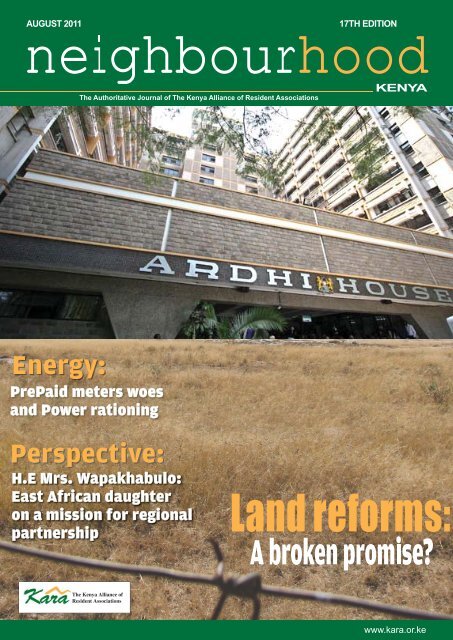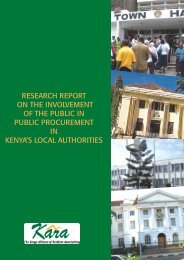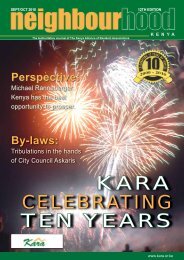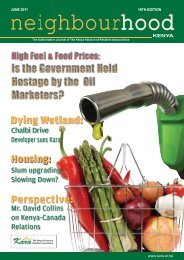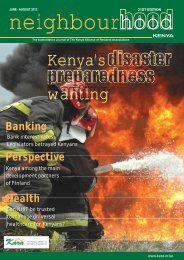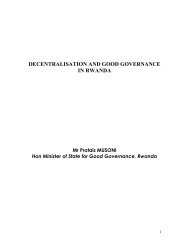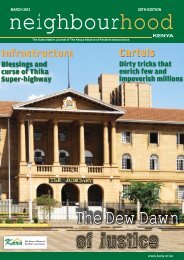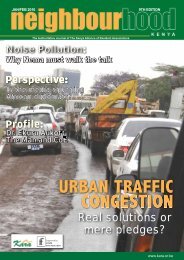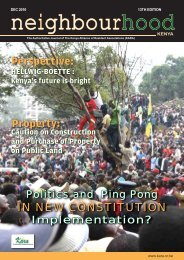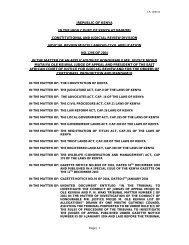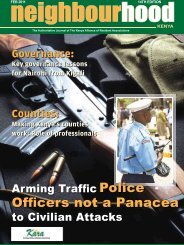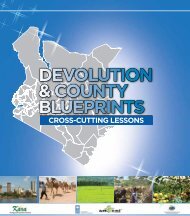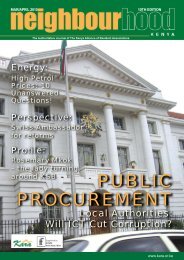KARA AUGUST 2011 ISSUE.indd
KARA AUGUST 2011 ISSUE.indd
KARA AUGUST 2011 ISSUE.indd
Create successful ePaper yourself
Turn your PDF publications into a flip-book with our unique Google optimized e-Paper software.
17TH EDITION<br />
neighbourhood<br />
<strong>AUGUST</strong> <strong>2011</strong><br />
The Authoritative Journal of The Kenya Alliance of Resident Associations<br />
KENYA<br />
Energy:<br />
PrePaid meters woes<br />
and Power rationing<br />
Perspective:<br />
H.E Mrs. Wapakhabulo:<br />
East African daughter<br />
on a mission for regional<br />
partnership<br />
The Kenya Alliance of<br />
Resident Associations<br />
www.kara.or.ke
COVER STORY<br />
Note<br />
Editor’s<br />
Welcome to the 17 th edition of your<br />
favourite public service delivery<br />
focused journal. We appreciate<br />
your support and encouraging feedback.<br />
Kenya has once again found itself in the<br />
list of shame among the family of nations for<br />
not being able to feed itself. The stark reality<br />
of starving Kenyans amidst contentious denial<br />
by the Government spokesman has put the<br />
government on the spot regarding its long term<br />
plan on food security for the country.<br />
We salute Kenyans who through the<br />
Kenyans for Kenya initiative demonstrated<br />
unprecedented solidarity and generosity to raise<br />
funds and donate food to save our starving<br />
brothers and sisters. We expect that this time<br />
round the Government has learnt its lessons<br />
the hardest and that long term measures will be<br />
put in place to address food insecurity in Kenya<br />
once and for all.<br />
On a different note, consumers of electricity<br />
are feeling short-changed by the Kenya Power’s<br />
(KP) prepaid meters initiative. Complaints<br />
range from lack of pre-installation education to<br />
unusually high power bills due to faulty meters.<br />
Read our evaluation of the prepaid meters<br />
initiative and why KP must take responsibility<br />
for the suffering of its customers.<br />
Kenyans have been waiting for reforms<br />
in the land sector for decades. However, the<br />
much touted reform in the sector appears to<br />
be encountering challenges and slowing down<br />
all-together. Is the Minister for Lands, a highly<br />
accomplished advocate for reforms, equal to<br />
the task of reforming the land sector? Read our<br />
analysis on progress and shortcomings of the<br />
reforms.<br />
Following the recent attainment of<br />
independence by the Republic of South Sudan,<br />
there are mixed feelings among Kenyans on<br />
what this portends for them. We provide expert<br />
analysis of some of the anticipated opportunities<br />
and challenges that may come with the great<br />
milestone achieved by South Sudan.<br />
Also read about the talented Kenyan youth<br />
and their level of preparedness in managing the<br />
fame and fortune that follows their success. Is<br />
Kenya doing enough to prepare the youth and<br />
ensure that they don’t become victims of their<br />
own success?<br />
As always, we look forward to your<br />
continued support in realising accelerated<br />
access to public service delivery. Karibuni!<br />
Land reforms<br />
remain a<br />
pipe dream<br />
Lands Minister James Aggrey Bob Orengo<br />
Reforms in the public sector seem<br />
alien to Ardhi House, the seat of<br />
the Ministry of Lands, given the<br />
pace and attitude it has adopted.<br />
Fed up with the state of affairs at the<br />
Ministry, the legal fraternity led by Law<br />
Society of Kenya chairman Ken Akide and<br />
Kenya Anti-Corruption Commission chief<br />
Prof. Patrick Lumumba recently organised<br />
a demonstration in Nairobi. They accused<br />
minister James Orengo of being soft on<br />
corrupt officials in his Ministry.<br />
The minister denies sleeping on the job.<br />
“When dealing with land issues you have to<br />
be cautious because you are dealing with<br />
some people, some of who have rights,” he<br />
said.<br />
Mr Orengo says people must consider<br />
both the negative and positive steps made,<br />
instead of blanket condemnation. So far,<br />
he said, critics have decided to ignore the<br />
Ministry’s efforts to repossess more than<br />
1,200 properties across the country.<br />
“We have repossessed land belonging to<br />
the judiciary, police, Ministry of Health and<br />
other public property in Nairobi, Kisumu,<br />
Mombasa, Eldoret, Kisii, Meru, Eldoret,<br />
Kakamega, Kwale and Malindi,” he said.<br />
Prof Lumumba thinks otherwise, and<br />
shares the view with many Kenyans who<br />
doubt the government’s commitment and<br />
will to eradicate corruption in the Ministry.<br />
Mukarara, who resides in the US posed:<br />
“If you pay for the title deed how long should<br />
you wait for it?” he says he paid his family<br />
attorney title deed fee and the lawyer has<br />
been telling him that there is shortage of<br />
titles. “Now he is telling me about gazetting<br />
the land again.” he even gave his e-mail<br />
(equatorjim@aol.com) for assistance. This<br />
is not uncommon in Kenya as staff at the<br />
Ministry collude with lawyers and valuers to<br />
defraud innocent citizens.<br />
The question remains unanswered: what<br />
would happen if the Ministry implemented<br />
the famous Ndung’u land report which is<br />
now gathering dust in the shelves of the<br />
Ministry and having cost the tax payer<br />
millions of shillings?<br />
Some people believe that the Ministry of<br />
Lands only has to implement the report in<br />
full and the rest would be history.<br />
“Instead what we hear is politicking.<br />
I never had any faith in Orengo after he<br />
3.
COVER STORY<br />
From Page 3<br />
Land reforms remain a pipe dream<br />
said that IDPs will not be resettled in their<br />
former lands. This, to me, displayed lack of<br />
understanding and leadership judgement.<br />
To this day, we still have IDPs in camps<br />
living horrendous lives and completely<br />
dependent on handouts,”<br />
Others believe that the rot at Ardhi<br />
House is deeply entrenched and requires<br />
time to be eliminated.<br />
A client of the Ministry who only<br />
identifi ed himself as Kusimbwa says,<br />
“Those who imagine that Orengo can get<br />
rid of the system in place within two years<br />
are lying to themselves. It takes goodwill on<br />
the part of leadership and the prosecution to<br />
curb corruption in the Ministry. The problem<br />
is that some of the Junior officers have<br />
accumulated so much wealth over the years<br />
and are able to pocket their seniors who<br />
might want to either transfer them to other<br />
ministries or suspend them. I say so from<br />
experience,” he said.<br />
Lands Permanent Secretary Dorothy<br />
Angote told the lawyers who had marched<br />
to the Ministry that the rot at the Ministry<br />
will not be solved by shouting but dialogue.<br />
Land remains a very prized asset in Kenya<br />
and discussions around it easily become<br />
emotional. It remains to be seen how the<br />
minister, known to be one of the most<br />
consistent and vocal advocate for reforms<br />
during Kenya’s ‘dark’ days, will realise<br />
reforms in his Ministry.<br />
“... the challenges we face are<br />
real. They are serious and<br />
they are many. They will not<br />
be met easily or in a short<br />
span of time. But know this<br />
America: They will be met.”<br />
When President Obama uttered<br />
these words to Americans at<br />
his inauguration on January<br />
21, 2009 little did he know that<br />
the same would apply to his<br />
fatherland Kenya.”<br />
Implementation Watch:<br />
Police vetting should<br />
have waited for the<br />
necessary laws<br />
That Kenya is struggling, and in most<br />
cases, fumbling with the implementation of the<br />
constitution is not in doubt.<br />
Several false steps have been made and<br />
blame game is part and parcel of the process.<br />
One of the false steps was the police vetting<br />
exercise that abruptly came to a halt.<br />
On the whole, police reforms are moving<br />
at slower pace than many would like, or<br />
envisaged.<br />
The vetting of police officers was put off<br />
until laws are in place to establish the Police<br />
Service Commission and the National Police<br />
Service.<br />
By then, the panellists from the Public<br />
Service Commission, Kenya Anti-Corruption<br />
Commission and National Security Intelligence<br />
Service had interviewed 1,114 senior police<br />
offi cers last month with the aim of retiring<br />
those found unfi t.<br />
The public had been excluded from the<br />
clandestinely run exercise as the police vetted<br />
itself on the account of taxpayers’ money.<br />
And with the pressure from the civil society<br />
unceasing, Vigilance House one morning<br />
decided to abandon<br />
the whole exercise.<br />
By then, millions of<br />
public funds had<br />
gone down the drain<br />
with little to show.<br />
Shouldn’t they<br />
have waited for<br />
the right time and<br />
environment to carry<br />
out the exercise? Or rather, shouldn’t they<br />
have invited their employers, the taxpayer,<br />
to listen into the evaluations? Why was the<br />
process allowed to go that far before being<br />
stopped?<br />
The Ransley report, adopted by the<br />
government to guide police reforms,<br />
recommended that senior officers from<br />
the rank of assistant commissioner be<br />
“subjected to a review against a criterion on<br />
professionalism, integrity, track record and<br />
psychological fitness.”<br />
Yet the manner the exercise started was<br />
bound to raise eyebrows. Security experts<br />
say Vigilance House was not interested in the<br />
exercise in the fi rst place but wanted to carry on<br />
with impunity as has been the case in the past.<br />
“They tested the waters and found the<br />
ocean depth unbearable,” says a member of<br />
the Usalama Reform Forum, a civil society<br />
lobby group dedicated to reforms in the security<br />
sector.<br />
The roles of the Attorney General<br />
Amos Wako and the Commission for the<br />
Implementation of the Constitution (CIC) also<br />
come into question. As the government’s chief<br />
legal adviser, Mr Wako should have told the<br />
police hierarchy how to go about the exercise<br />
after interpreting the constitution and the<br />
recommendations of the Ransley report.<br />
On the other hand, CIC ought to have<br />
exercised their oversight role in implementation<br />
to advise police to hold on until the necessary<br />
laws are in place.<br />
The implementation is therefore facing major<br />
hurdles as the August 27 fast approaches. It is<br />
the date after which any citizen of Kenya can<br />
go to court to compel parliament to pass any<br />
constitution implementation enabling law (s) or<br />
else have the parliament disbanded.<br />
Disclaimer:<br />
Neighbourhood Kenya is produced bi-monthly by The Kenya Alliance of Resident Associations (<strong>KARA</strong>) The opinion expressed in the articles are those of the authors and<br />
do not necessarily reflect <strong>KARA</strong>’s offi cial position. The editor welcomes contributions of articles and photographs from members of the public. Any materials received will<br />
be treated as unconditionally assigned for public and will be subject to <strong>KARA</strong>’s unrestricted right to edit and publish.<strong>KARA</strong> reserves the right of this publication and no<br />
part can be published in anyway without express permission.
PERSPECTIVE<br />
H.E Mrs. Wapakhabulo:<br />
The East African<br />
daughter on a mission<br />
for regional partnership<br />
Down to earth, God fearing,<br />
energetic and outgoing – these<br />
are the adjectives that come<br />
to mind upon meeting the Ugandan High<br />
Commissioner to Kenya and permanent<br />
representative to UN Habitat and UNEP,<br />
Her Excellency Mrs. Angelina Chogo<br />
Wapakhabulo for the first time. She<br />
considers herself a true daughter of East<br />
Africa, having been born and raised in<br />
Tanzania, married in Uganda and now<br />
working in Kenya.<br />
She has not been in the diplomatic<br />
circles and her posting to Kenya in August<br />
2009 was the fi rst diplomatic position in<br />
I am keen to<br />
create linkages<br />
and partnerships<br />
between Kenyan<br />
entrepreneurs and<br />
their Ugandan<br />
counterparts<br />
her career. Her interests and focus has<br />
always been in the area of administration,<br />
education, social service as well as<br />
business entrepreneurship.<br />
Despite being an ‘outsider’ in diplomatic<br />
circles, she believes she has what it takes<br />
to effectively execute her duties. She<br />
considers her appointment as a vote of<br />
confidence by President Yoweri Museveni in<br />
her capability to serve her country and she<br />
is determined not to let her country down.<br />
Before her posting as an ambassador,<br />
she was actively involved in various<br />
community based projects with various<br />
local and international non-governmental<br />
6.
PERSPECTIVE<br />
organisations. Some of the countries she<br />
has worked in include Tanzania, Papua<br />
New Guinea and Australia. She holds<br />
a bachelors honours degree from the<br />
University of Dar-es-salaam and masters in<br />
educational administration from Queensland<br />
University in Australia.<br />
While studying at the University of Dares-salaam<br />
she met a Ugandan who later<br />
became her husband. “When I married<br />
a Ugandan and applied for citizenship, I<br />
felt welcomed in Uganda and empowered<br />
to participate in all the country’s socioeconomic<br />
and political affairs. I gave my<br />
heart to Uganda”, she explains.<br />
Given that her husband was a politician,<br />
she found herself working with various<br />
community based organizations and this<br />
provided an opportunity for her to have a<br />
deeper understanding of the culture and<br />
politics of Uganda.<br />
Since her arrival to Kenya as Uganda’s<br />
High Commissioner, her main focus<br />
has been on improving trade relations<br />
and entrepreneurship between the two<br />
countries. “I am keen to create linkages<br />
and partnerships between Kenyan<br />
entrepreneurs and their Ugandan<br />
counterparts and ensuring that they exploit<br />
of their comparative advantages.” So far up<br />
to 20 business entrepreneurs in Kenya have<br />
been linked to various partners in Uganda.<br />
She is also keen to help rectify the trade<br />
imbalance which is currently tilted in favour<br />
of Kenya.<br />
Mrs. Wapakhabulo rarely travels to<br />
her country by any other means apart<br />
from road. She believes this gives her an<br />
opportunity to witness fi rst hand some of the<br />
challenges the traders and transporters go<br />
through, particularly at the borders and thus<br />
contribute to seeking solutions to the same.<br />
One of the greatest lessons she believes<br />
East African countries can learn from<br />
Kenya is the participatory and consultative<br />
constitution making process. “As<br />
one of the observers during the<br />
constitution referendum last year,<br />
I believe that Kenyans should be<br />
proud that the exercise was fair,<br />
transparent and democratic,”<br />
she says. She also has kind<br />
words regarding the ongoing<br />
constitution implementation<br />
process particularly the process<br />
of vetting those aspiring to<br />
occupy public offi ces.<br />
While she welcomes the<br />
integration of Eastern Africa<br />
countries into East Africa<br />
Community, she advises that<br />
there is need for the countries to invest in<br />
education and public awareness of the EAC<br />
protocol. “The governments should also<br />
ensure that various policies are harmonized<br />
to ensure smooth operations and relations<br />
between the countries,” she adds.<br />
Personal Life<br />
Mrs. Wapakhabulo was brought up in a<br />
Catholic environment surrounded by nuns<br />
and monks and this made her to admire<br />
their lifestyle and values. She decided that<br />
she wanted to be a nun when she grows<br />
up. This was however not to be as when<br />
she joined high school away from home and<br />
subsequently college, she decided to pursue<br />
a different career altogether.<br />
During her free time, she loves taking a<br />
walk around her neighbourhood as a way of<br />
exercising. She wakes up at 5a.m. every day<br />
and tunes into one of the local TV stations to<br />
follow fitness exercise instructions.<br />
Currently she is learning French to enable<br />
her communicate to diverse groups of people<br />
that she meets in the course of her work. She<br />
used to play golf in Uganda and is planning<br />
to join one of the golf clubs in Kenya soon.<br />
She is also a philanthropist and an<br />
active member of the Muthaiga<br />
chapter of Rotary Club. Once in<br />
a while she takes a glass of beer<br />
and Uganda’s traditional brew.<br />
She also loves dancing.<br />
What constitutes happiness<br />
for her? “I am happiest when<br />
I am spending time with my<br />
family especially grand<br />
children and of course I<br />
like being at peace with<br />
God. That is my<br />
idea of<br />
happiness “ she explains.<br />
The life and deeds of the late Mother<br />
Teresa inspires her so much and politically<br />
she considers her late husband as her<br />
mentor. She also appreciates President<br />
Museveni for always challenging her to<br />
come up with solutions to her people’s<br />
problems.<br />
Mrs. Wapakhabulo is 62 years ‘young’<br />
(she prefers to refer to her age that way)<br />
and is a proud mother of four biological<br />
children (3 boys and 1 girl) and several<br />
others that she has taken care of over time.<br />
She also has six grandchildren. She is the<br />
5th born in a family of nine -four girls and<br />
five boys.<br />
7.
ENERGY<br />
For all intents and purposes, Kenya<br />
Power’s prepaid metering project arose<br />
out of the fi rm’s need to improve its<br />
revenue collection.<br />
At least this holds true if the hue and cry from the<br />
clients who are connected via the prepaid meters are<br />
anything to believe.<br />
Take for instance, at the beginning of April a<br />
client who did not wish to be named paid Sh270<br />
for 26 units. The same client paid Sh300 a month<br />
later and the units had gone down to 25. Early July,<br />
he bought 11 units for Sh250.The same amount of<br />
money does not purchase similar amount of units for<br />
different clients at same time, the client said.<br />
Meanwhile, fresh from rebranding, Kenya<br />
Power claims that apart from improving revenue<br />
collection, the prepaid meters would also improve<br />
customer service.“The benefi ts of the project<br />
include elimination of estimated bills, elimination<br />
of disconnection, enhanced customer privacy,<br />
decongestion of the Kenya Power’s customer<br />
service centres, and reduced financial losses to the<br />
Company due to unpaid bills,” the power fi rm said in<br />
a statement on prepaid meters on July 13.<br />
So far, the reality on the ground is as far from<br />
Kenya Power’s assertion as East is from West. Or<br />
rather, customers don’t easily feel the benefi ts of the<br />
prepaid metering.<br />
The power fi rm carried out the pilot phase until<br />
March <strong>2011</strong> when the roll-out commenced. According<br />
to the Kenya Power Corporate Communications<br />
Department, by June 30, an additional 123,000<br />
prepaid meters had been installed, mainly in Nairobi.<br />
Yet with the many customer queries, Kenya<br />
Power (KP) has to give answers as to whether<br />
customer education ever took place during the pilot<br />
phase. Going by the level of dissatisfaction with the<br />
prepaid meters, KP noted in the statement the fact<br />
that there have been some faulty meters.<br />
“...during the ongoing exercise to install prepaid<br />
meters, there have been some cases regarding<br />
faulty meters, and the company has been taking<br />
corrective measures on a case by case basis.<br />
Preliminary investigations indicate that the<br />
faulty meters detected so far are below five percent<br />
of all the meters installed, led, which is within in the<br />
internationally accepted cepted range for a project of this<br />
size and scope,” the statement reads<br />
in part.<br />
This is just part of the problem because e anyone<br />
who has had the opportunity portun<br />
to use ethe<br />
prepaid<br />
pa meters, in almost all<br />
cases, have a bad<br />
story to<br />
tell. If<br />
it’s not inconsistent<br />
units for same amount of money,<br />
it is likely<br />
to be that<br />
Kenya<br />
Power<br />
took unusually<br />
u ly<br />
too long to credit their accounts, cou<br />
leaving them in<br />
darkness for<br />
hours on<br />
end.<br />
Many are the unanswered ed questions:<br />
• Is Kenya Power forcing consumers s to accept the<br />
installation lation<br />
of the prepaid meters in their houses?<br />
s?<br />
• Does a customer have et<br />
the chance<br />
ce<br />
to<br />
choose<br />
between prepaid and postpaid paid meters, much<br />
like<br />
in the mobile telephony?<br />
• Complaints have also<br />
arisen over<br />
the<br />
quality of<br />
KPLC’s prepaid<br />
meters is now a<br />
nightmare<br />
the prepaid meters being installed with some<br />
clients experiencing frequent breakdowns.<br />
So therefore, will the real Kenya Power<br />
please stand up?<br />
The firm notes that education for clients<br />
cannot be wished away and has set up customer<br />
care contacts. “The company now realises that<br />
the complaints/enquiries mechanism regarding<br />
prepaid metering requires urgent enhancement<br />
in order to pre-empt inconvenience and<br />
instill confidence in prepaid metering among<br />
customers,” the power firm said in a statement.<br />
Meanwhile, the blackouts are once again<br />
here. And for the next two months or so, major<br />
urban centres and industries have to look for<br />
alternative energy sources as power rationing is<br />
underway.<br />
According to the schedule published by<br />
Kenya Power, the blackouts will be at the most<br />
inconvenient of times — between 6.40pm and<br />
9.30pm. Many are the factories that will have<br />
to close early and incur losses. Such losses<br />
can only translate in staff rationalization for the<br />
businesses to stay afloat.<br />
The last time the company rolled out a power<br />
rationing programme was in 2000 when drought<br />
reduced the water levels in the Seven Forks dams,<br />
leading to the shutdown of Kamburu dam.<br />
Much as Kenya Power managing director<br />
Joseph Njoroge wants to transfer the blame to power<br />
generating companies and the Treasury, the power<br />
distributor must also take the blame for informing its<br />
customers too late into the rationing.<br />
Kenya Power has a 90 megawatt shortfall that<br />
will have to be taken care of through expensive<br />
emergency generators, meaning high power bills for<br />
both domestic and industrial consumers.<br />
Suspicion that the company was rationing power<br />
started late June but Kenya Power vehemently<br />
denied that that was happening.<br />
At the time, several parts of the country, including<br />
the capital city, Western parts, Central and Eastern<br />
parts, were experiencing erratic power supply. Migwi<br />
Theuri, spokesman for the electricity distributor,<br />
at the time attributed the erratic power supply in<br />
western Kenya to a fault in one of the machines<br />
at Turkwell Power station. As a result of the fault,<br />
Kenya Power was not getting adequate capacity for<br />
Western region, which is the most affected, he said.<br />
As it is now, Kenyans have to adopt coping<br />
mechanisms until the imposed blackouts end.<br />
8.
OUR PEOPLE<br />
HILLVIEW RESIDENTS ASSOCIATION<br />
OUR PEOPLE<br />
Hillview Residents Association (HRA) is one<br />
of the oldest associations in Kenya having<br />
been formed 25 years ago to respond to<br />
insecurity challenges, lack of street lights within the estate,<br />
deplorable roads within the neighbourhood among other<br />
issues. The association is also credited for being among<br />
the very first associations to embrace community policing.<br />
Through the efforts of the association, Hillview estate<br />
has since become secure, has had functional street<br />
lights installed and the roads within the neighbourhood<br />
have been repaired and there is a greater sense of good<br />
neighbourliness among the residents of our estate.<br />
However, new challenges of illegal developments,<br />
grabbing of public land and questionable change of single<br />
dwelling properties to multi-dwelling have escalated.<br />
To address these challenges, the association has been<br />
engaging City Council of Nairobi and relevant government<br />
agencies some of whom we fear could be condoning<br />
with a few unscrupulous developers to abet the said<br />
malpractices.<br />
With the support of Kara, Hillview Residents<br />
Association has recorded some progress in the fight<br />
against the new challenges but there is still more to<br />
be done to ensure that order and good environmental<br />
practices are adhered to particularly by the developers.<br />
Under the able stewardship of Mr. Dhiru Shah,<br />
the association joined hands with Kara and Greenbelt<br />
Movement to stop development of 10 residential villas on a<br />
grabbed riparian valley within the neighbourhood.<br />
The major challenge for the association is the limited<br />
finances taking into consideration the fact that the<br />
unscrupulous developers are well endowed financially and<br />
politically and are willing to spend huge amounts of money<br />
to have their way and mute opposition from residents.<br />
Another slight challenge is a few residents of the<br />
estate are unwilling to support the association and don’t<br />
make regular contributions to the association kitty. Lack<br />
of supporting legal framework to allow for full recognition<br />
of residents associations by Government also makes<br />
it difficult for meaningful engagement on public service<br />
delivery issues.<br />
Finally, Hillview Residents Association would like to<br />
encourage residents associations to join Kara, in their<br />
numbers, so as to make the Alliance stronger and ensure<br />
that those in position of authority are held accountable for<br />
their actions in line with Kara’s slogan - “Together, We Will”
SPORTS<br />
Talented youths need<br />
counselling on risky behaviours<br />
On May 15,<strong>2011</strong> the sporting<br />
world woke up to<br />
shocking news of the death of<br />
one of Kenya’s top athletes,<br />
Samuel Kamau Wanjiru,<br />
(Pictured)<br />
He had allegedly<br />
jumped to his death<br />
from the balcony of his<br />
Nyahururu mansion after<br />
a disagreement with<br />
his wife Tereziah Njeri,<br />
a very tragic end to the man who<br />
became the first Kenyan to win an<br />
Olympics gold medal in Marathon<br />
at the 2008 Beijing Olympics.<br />
But as the dust settles down<br />
over the circumstances<br />
surrounding his death, many<br />
questions abound and the<br />
fingers are pointing<br />
to the government.<br />
Many are the<br />
unanswered<br />
questions:<br />
Is the<br />
Government<br />
doing enough,<br />
or anything to<br />
support elite athletes<br />
and other talented<br />
youths? What about the<br />
sports associations in the<br />
country? What else should the<br />
country have done differently to save<br />
the life of Wanjiru?<br />
Soon after his death, at least<br />
three women other than his wife<br />
Tereziah claimed to have been<br />
married to him, or that he<br />
fathered their children. This raises questions<br />
about famed youths struggling with<br />
destructive traits.<br />
Between the period after the 2008<br />
Beijing Olympics and the time of his death,<br />
Wanjiru was wallowing in millions of dollars<br />
from participating and winning international<br />
marathons. At just 24 when he died, he<br />
needed a lot of counselling to manage the<br />
sudden wealth that was coming his way.<br />
And who else was in a better position<br />
to do this than Athletics Kenya? In fact, the<br />
counselling and nurturing should be done for<br />
all its athletes, particularly about life skills and<br />
investment of their huge incomes from<br />
prizes, bonuses, and endorsements.<br />
Many have succumbed to<br />
depression, hopelessness,<br />
alcohol abuse and fallen from<br />
glory to grass.<br />
The<br />
government only takes notice when<br />
they are gone, like Wanjiru.<br />
The emphasis<br />
on medical and dope<br />
tests by sports bodies<br />
also should extend to<br />
psychiatric assessment to<br />
ensure that all is well<br />
with our stars.<br />
As the UK House of Commons<br />
Committee of Public Accounts observed<br />
in a report UK Sport: Supporting elite<br />
athletes (Fifty–fourth Report of Session<br />
2005–06), sport is not just about medals<br />
or a celebrity culture, but about the benefits<br />
of taking part- in Wanjiru’s case, strong family values,<br />
investment culture and general life skills.<br />
The face that many athletes have left Kenya for<br />
other countries especially those in the Middle East<br />
exemplifies the kind of nurturing that we badly need<br />
to preserve and protect our own. The government<br />
must look into their economic and social wellbeing.<br />
Yet as Macharia Gaitho of the Editors’ Guild<br />
observed on the day Wanjiru died, “Does Athletics<br />
Kenya have a programme to monitor<br />
and support the young men and women thrust from<br />
humble, deprived backgrounds to instant fame and<br />
fortune?”<br />
“Do we really care for these national heroes<br />
beyond shining in the reflected glory? Who provides<br />
the support, guidance and counselling when life<br />
starts to unravel? Who protects them from all the<br />
sharks? Who helps them remain on an even keel<br />
when they might be dizzy with all<br />
the riches and adulation?<br />
What do those<br />
managers<br />
and<br />
coaches do other than running cash-minting<br />
machines?<br />
Mr Gaitho concluded: “We are failing these<br />
young national heroes.”<br />
According to Kamau Macharia of Sports<br />
Boosters, the government has been abandoning<br />
sports people at the airport whenever their<br />
performance is below expectation. “We wonder why<br />
a parent would throw away his child for failing in<br />
an exam when all along he has been at the top. It<br />
demoralizes us to know that the government is only<br />
with us when we are winning but completely turns its<br />
back on us for isolated failures,” he said.<br />
10.
.<br />
Bronze (Kshs350,000) with varied benefits<br />
4. Water Services Regulatory Board<br />
5. KPMG Kenya
CONSTITUTION<br />
Should TJRC’s<br />
mandate<br />
be extended?<br />
With just over three months to<br />
the end of its mandate, the<br />
Truth Justice and Reconciliation<br />
Commission (TJRC) is staring at the possibility<br />
of failing to cover the entire country.<br />
Nearly a year of infi ghting among the<br />
commissioners, compouded by the inadequate<br />
funding by the government, or fi nancial<br />
sabotage by the Treasury, reduced the<br />
Commission to a laughing stock. Pressure by<br />
the civil society activists and the survivors of<br />
historical injustices like the Wagalla massacre<br />
and Nyayo House torture for former chairman<br />
Bethwell Kiplagat to resign didn’t help TJRC’s<br />
cause.<br />
And with the November deadline fast<br />
approaching, the commission fi nds itself<br />
way behind schedule. Since April 11 when<br />
the public hearings began after tumultuous<br />
18 months, the commission has been to<br />
North Eastern, Upper Eastern and Mt. Elgon.<br />
Hearings have also taken place in Kisumu,<br />
Kisii and Kuria.<br />
And the commissioners are now seeking<br />
an extension of their mandate by at least six<br />
months. To justify the case for extension, the<br />
acting chairman Tecla Namachanja says the<br />
Commission’s work was hampered by the<br />
leadership dispute over its former chairman<br />
Kiplagat and fi nancial diffi culties that made it to<br />
operate a skeleton outfi t.<br />
Mr Kiplagat has since stepped aside to<br />
pave the way for a tribunal appointed by former<br />
Chief Justice Evan Gicheru to investigate the<br />
allegations leveled against him.He was even<br />
called to testify, as a key witness, during the<br />
Commission’s hearings held in<br />
Nairobi for the Wagalla massacre.<br />
Former vice chairperson Betty<br />
Murungi resigned in the fi rst year of the<br />
Commission’s establishment as the Kiplagat<br />
saga showed no sign of ending.As a result<br />
of the Kiplagat-civil society tussles, the<br />
commission says in the progress report to<br />
Parliament that it lost considerable amount of<br />
time and credibility.<br />
“Secondly, the Commission has suffered<br />
from fi nancial and resource constraints<br />
that have resulted in recurrent delays and<br />
limitations in its operations,” the report states.<br />
The commission started hiring directors and<br />
staff in September 2010, several months after<br />
its establishment as a result of the inadequate<br />
funds.<br />
Despite the drawbacks, the Commission<br />
lists some of its achievements so far, including<br />
establishing a functioning secretariat and<br />
accomplishing the statement taking process<br />
where it collected 30,000 individual statements<br />
and over 600 memoranda from communities,<br />
organisations and individuals.<br />
Ms Namachanja hopes<br />
the MPs will listen to their<br />
request and pass the<br />
new Truth Justice and<br />
Reconciliation Act once<br />
the amendments done<br />
by the minister for Justice,<br />
Constitutional Affairs and<br />
National Reconciliation<br />
Mutula Kilonzo reach<br />
the fl oor of the House.<br />
The commission, set up<br />
in 2009 to investigate<br />
past injustices and lead<br />
reconciliation efforts in<br />
the country, had been<br />
granted until November<br />
this year to complete its task.<br />
“Apart from the truth, people are also<br />
interested in justice and for most of them,<br />
justice simply means acknowledgement of<br />
the violations that took place and an apology.<br />
Looking at the mandate, the broad issues and<br />
the number of regions we have not been able<br />
to reach, the time remaining, which is up to<br />
November is not enough for us to complete<br />
this work.<br />
12.
CONSTITUTION<br />
And with an extension, we shall be able to<br />
reach all the regions of this country,” she said.<br />
Already, Prime Minister Raila Odinga and<br />
his deputy Musalia Mudavadi have endorsed<br />
the request by TJRC. Mr Mudavadi explained<br />
that the Commission “is a very important<br />
segment of reconciliation and healing and<br />
necessary for the country pulling together” as<br />
he called on MPs to follow their example and<br />
amend the Act.“It is very clear that if the TJRC<br />
has only done a portion of its work and for it<br />
to conclude its mandate without visiting other<br />
parts is in itself injustice,” said Mr Mudavadi.<br />
“The request is legitimate and I would like to<br />
encourage the commission to talk to more of<br />
us (MPs) and put the case across to Kenyans<br />
that it would be necessary to be granted this<br />
extension. I therefore lend my support to the<br />
commission and to appeal to my colleagues<br />
in particular that we look at the request<br />
favourably,” the Deputy PM added.<br />
The PM on the other<br />
hand gave a fi rm pledge<br />
that the government<br />
will prepare a<br />
cabinet paper<br />
recommending the<br />
extension to enable<br />
the Commission<br />
make up for the<br />
period it lost<br />
during its initial<br />
stages. Ms<br />
Namachanja<br />
cautions that<br />
without the<br />
extension, TJRC<br />
will be committing<br />
more injustices than it will have<br />
uncovered in its tumultuous two-year lifespan.<br />
“If we don’t get the extension then it means<br />
that regions like Rift Valley, Central, Nairobi<br />
and Coast will not benefi t from the work of this<br />
commission. But based on experience, we<br />
are aware that people are out there who want<br />
to come forward to share their experiences,”<br />
said Ms Namachanja.<br />
Editor’s Note: As we went to press,<br />
Parliament approved extension of TJRC life to<br />
run until May 2012<br />
Photo: Victims of Wagalla Massacre<br />
13.
FAMINE<br />
The gods are not<br />
to blame for the<br />
raging famine<br />
in Kenya<br />
As we switch on our TVs and turn<br />
newspaper pages, we are daily<br />
bombarded with gory photographs<br />
of needy and near dying Kenyans due to the<br />
ongoing drought-related famine challenge that<br />
has now led to Kenya’s shame among family of<br />
nations.<br />
From the contentious view of Government<br />
Spokesman Dr Alfred Mutua on plain denial of<br />
any death from starvation, elite GMO food safety<br />
debate to the highly successful ‘Kenyans for<br />
Kenya’ campaign, Government is struggling to<br />
put a brave face in the unfolding famine crisis.<br />
The blame game is in high gear and fingerpointing<br />
goes on unabated. But as Nigerian<br />
novelist Chinua Achebe would bluntly ask the<br />
government, where did the rain begin beating us?<br />
The food security situation has deteriorated<br />
unabatedly for most households in all the arid<br />
and semi arid lands (ASAL). And pastures have<br />
dried up.<br />
This situation has been intensified by<br />
the failure of the <strong>2011</strong> rains and the same<br />
exacerbated by the unfavourable October<br />
– December 2010 rains which severely<br />
limited the replenishing of water sources and<br />
regeneration of pasture.<br />
According to a recent United Nations<br />
report, <strong>2011</strong> has been the driest year since<br />
1995 and has reported the lowest rainfall in<br />
60 years.<br />
The Kenya Food Security Steering<br />
Committee estimates that approximately 3.5<br />
million people are affected by drought and 2.4<br />
million are food insecure. Acute malnutrition<br />
has reached 37 per cent in some parts of<br />
north east Kenya, which is double the 15 per<br />
cent emergency threshold.<br />
While the situation is severely felt in north<br />
and eastern Kenya namely Marsabit, Wajir,<br />
Moyale, Isiolo, Garissa and Turkana, other<br />
areas reporting serious food defi cit include<br />
Kitui, Makueni, Mwingi, Tharaka, Mbere,<br />
Malindi, Kwale, Kilifi and Taita Taveta.<br />
As a result, the number of households<br />
requiring water sourced from trucks has<br />
increased substantially in Marsabit, Mandera<br />
and Turkana, among others. Water related<br />
confl icts have been reported in Baringo, West<br />
Pokot, Tana River, Wajir and Isiolo, among<br />
others.<br />
The value of livestock, which is the main<br />
livelihood for many households in the worst<br />
affected areas, has depreciated and the<br />
livestock markets have collapsed.<br />
It is on record that the Meteorological<br />
Department did sound the alarm bell much<br />
earlier. Then, the department observed that<br />
the rains this year were going to be less than<br />
average in some places and that there was<br />
going to be food insecurity.<br />
It further advised that the situation needed<br />
to be addressed and planned for before<br />
the situation got out of hand. Unfortunately,<br />
they were laughed out of town. Therein<br />
lays the source of our tribulations: The<br />
tendency to ignore scientifi c data and to<br />
plan in spite of it. Coupled with this is the<br />
tendency to deny again in spite of the facts.<br />
14.
FAMINE<br />
PHOTO: Courtesy Google.com<br />
The government spokesman Dr Alfred Mutua,<br />
a highly educated man with several degrees to<br />
boot, had the temerity to deny the obvious on<br />
national TV at the cost of taxpayers.<br />
Government offi cials, including the Minister<br />
for special programme Esther Murugi, insist that<br />
there is enough food. Indeed ours is a country<br />
of contradictions. It is said that while in some<br />
parts of Kenya food is rotting in others women,<br />
children and the aged are literally staring at<br />
death due to starvation.<br />
Why is it impossible for the Government to<br />
map out the areas with food and those without<br />
and, as Governments should, put in place<br />
mechanisms that enable redistribution of food?<br />
Again, the Government has been long on policy<br />
but short on implementation.<br />
Year in year out there are policy statements<br />
about how the country should migrate from rainfed<br />
agriculture to irrigation. The government<br />
went further and crafted a Ministry of Water and<br />
Irrigation. So where is the food and or who is<br />
not doing his job?<br />
The failure of government to plan and<br />
focus on long term projects has exacerbated<br />
the situation. A few years ago, Malawi was<br />
in the same situation as is Kenya today.<br />
However with proper planning and long term<br />
focus Malawi is an exporter of food.<br />
From the foregoing, there is need to put in<br />
place a programme for extension services to<br />
provide the knowledge and skills that farmers<br />
need to produce optimally. According to the<br />
Egerton University based Tegemeo Institute,<br />
Kenya has about 3 million small scale farmers<br />
who account for 75 per cent of the total maize<br />
crop.<br />
In addition, the national average maize<br />
yields per hectare are estimated at 20 bags<br />
of 90 kilogramme. These yields are about one<br />
twentieth of those attained internationally in<br />
countries such as Argentina.<br />
Besides, the land policy that allows<br />
subdivision of land to untenable sizes is<br />
also a contributory factor. There should be a<br />
minimum landholding in agricultural areas.<br />
Kenyan farmers are better advised to grow<br />
traditional crops such as cassava, potatoes<br />
and millet that are drought resistant and easier<br />
to store.<br />
Abundant worldwide evidence has shown<br />
that the incentives and ability of farmers to<br />
make investments in productivity-enhancing<br />
inputs and production methods depends on<br />
reducing the transaction costs and risks of<br />
exchange across inputs, credit, and output<br />
markets.<br />
Throughout the world, the major share of<br />
staple food costs to the consumer is typically<br />
accounted for by marketing costs. In most<br />
countries in eastern and southern Africa,<br />
maize marketing costs account for about<br />
40% to 60% of the total retail price of maize<br />
meal paid by consumers.The reduction of<br />
these costs represents a major opportunity<br />
to improve farm production incentives and<br />
simultaneously make food more affordable to<br />
low-income consumers.<br />
www.cofek.co.ke<br />
15.
SOUTH SUDAN<br />
Opportunities<br />
and challenges in<br />
South Sudan<br />
The declaration of independence<br />
on July 9 was a momentous<br />
occasion for millions of South<br />
Sudanese, who had endured the policy of<br />
oppression and segregation by the mainly<br />
Arab North.<br />
It was not only them celebrating, but<br />
they were joined in the celebrations by other<br />
countries in the region that have also seen<br />
the upsides.<br />
That Nairobi is interested in Juba is an<br />
open secret and the interest palpable. It is<br />
not just Nairobi but the entire region. Kenya<br />
started courting Juba way back during its<br />
fi ght for independence. Kenya provided a<br />
venue for negotiations leading to the signing<br />
of peace agreement in 2005.<br />
A pledge for $3.5 million (Sh315 million<br />
by current rates) assistance to train South<br />
Sudan’s nascent civil servants on January<br />
5 this year, just came as the icing on the<br />
cake as Nairobi woos Juba to its side. The<br />
offer of $3.5 million came just three days to<br />
the historic separation referendum in South<br />
Sudan.<br />
South Sudan holds about 4.8 billion<br />
barrels of proven oil reserves. This is what<br />
Kenya needs- affordable oil that the South<br />
can easily provide. Besides, Juba now<br />
hosts about 70,000 Kenyan entrepreneurs<br />
as well as workers with international Non-<br />
Governmental Organisations.<br />
There have been suggestions that Juba<br />
authorities are considering constructing a<br />
pipeline across Kenya to the Coast from<br />
where it can export. At the moment, its oil<br />
has to pass through Khartoum from which<br />
it has just seceded. If that were to happen,<br />
Kenya would greatly benefit from cheaper<br />
oil and an accompanying boost to the<br />
economy.<br />
More than the oil, unemployment<br />
among young people - including university<br />
graduates - has long been a big problem<br />
in much of Africa. Kenya is no exception.<br />
South Sudan, having been at war for two<br />
decades has a high illiteracy rates. The new<br />
country will therefore need to import labour.<br />
“Well, it now seems that the longstanding<br />
problem of unemployment among educated<br />
youth may be substantially reduced through<br />
a piece of good fortune that Kenyans - and<br />
Ugandans - are trying very hard not to gloat<br />
over,” says Wycliffe Muga, the BBC World<br />
Service correspondent for “Letter from<br />
Africa”.<br />
For the thousands of Kenyans who work<br />
in South Sudan, life could only get better.<br />
“The place is fine and the celebration mood<br />
is driving business,” says Jacob Oduor who<br />
left Nairobi for Juba in 2010. It is not only<br />
for individuals but Kenyan banks have also<br />
set base in Juba and Rumbek and are doing<br />
brisk business. They include KCB, Equity<br />
and Co-operative Bank of Kenya among<br />
others. Kenya Airways and other budget<br />
airlines like Jetlink too fly the Nairobi-Juba<br />
route.<br />
For the Intergovernmental Authority<br />
on Development (IGAD), an independent<br />
South Sudan means less headache as far<br />
as regional security is concerned. Focus<br />
could now shift to the lawless Somalia as<br />
the region battles to curb insecurity and<br />
unhindered human suffering.<br />
But it is not all rosy for the neighbours.<br />
16.
SOUTH XXXXXXXX SUDAN PROFILE<br />
PHOTO: Courtesy caelainn.wordpress.com<br />
South Sudan holds<br />
about 4.8 billion<br />
barrels of proven<br />
oil reserves. This<br />
is what Kenya<br />
needs- affordable<br />
oil that the South<br />
can easily provide.<br />
Besides, Juba<br />
now hosts about<br />
70,000 Kenyan<br />
entrepreneurs as<br />
well as workers<br />
with international<br />
Non-Governmental<br />
Organisations.<br />
The millions of South Sudanese who fought<br />
for independence are illiterate, jobless and<br />
poor.<br />
Many are hoping that the declaration of<br />
independence will come with instant jobs,<br />
wealth and generally improved standards of<br />
living. Fears of xenophobic attacks cannot<br />
be wished away as the jobs these South<br />
Sudanese are eyeing are currently held by<br />
foreigners.<br />
In December 2009, a lone gunman killed<br />
three Kenyans in Juba after disagreement.<br />
Kenya demanded an explanation with<br />
former Foreign Affairs minister Moses<br />
Wetang’ula saying cases of harassment of<br />
Kenyans in South Sudan and destruction of<br />
their businesses had been reported.<br />
Hassan Omar of the Kenya National<br />
Commission on Human Rights (KNCHR)<br />
has also stated that his organisation had<br />
been forced to intervene on a number of<br />
times over mistreatment of Kenyans in<br />
South Sudan. Most important, the friends<br />
that new state chooses could well determine<br />
its relations with the region so will be the<br />
system of governance.<br />
17.
ENVIRONMENT<br />
Kara, Environment Ministry<br />
strike partnership deal<br />
The Ministry of Environment and<br />
Mineral Resources (MEMR) is<br />
ready and willing to fully embrace<br />
partnerships and public participation<br />
as provided for in Article 69 (d) of the<br />
constitution.<br />
This was the clear message from the<br />
Permanent Secretary Mr. Ali. D. Mohamed<br />
when Kara delegation paid him a courtesy<br />
call on 1st August <strong>2011</strong>. The PS was<br />
categorical that matters of environment are<br />
too critical and wide to be left to the Ministry<br />
alone.<br />
During the meeting, it was agreed<br />
that Kara and MEMR will start working<br />
closely on specifi c environmental issues to<br />
enhance access to public service delivery.<br />
Acknowledging that the ministry’s<br />
outreach programme has not been very<br />
effective, the PS explained that they<br />
have recorded many successes through<br />
various partnerships but this has not been<br />
communicated to the public.<br />
Beyond promoting good environmental<br />
governance and practices, the partnerships<br />
have also transformed people’s lives<br />
making some of them responsible<br />
citizens. For instance, some of the people<br />
participating in the ministry’s green rangers<br />
initiatives have changed from being<br />
involved in criminal activities to engaging in<br />
gainful activities.<br />
Some of the areas the ministry<br />
and Kara will forge partnership include<br />
establishment of environmental scouts;<br />
review of the Environmental Management<br />
and Coordination Act (EMCA); coordinated<br />
tree planting in different parts of the country;<br />
restoration of wetlands that may have been<br />
defiled; establishment of botanical gardens<br />
in various counties; initiatives aimed at<br />
transforming Kenya into a kerosene free<br />
country and environmental awareness<br />
programmes, particularly targeted at the<br />
slum areas.<br />
Kara is ready and willing to partner with<br />
the MEMR to promote good environmental<br />
practices and governance.<br />
We welcome the responsiveness of<br />
the ministry to public participation and<br />
demonstrated willingness to work with<br />
various stakeholders to ensure a better<br />
environment.<br />
Kara delegation was led by the<br />
Chairman, Andrew Enniskillen; CEO,<br />
Stephen Mutoro; Treasurer, Ephraim<br />
Kanake and Programs Manager, Henry<br />
Ochieng.<br />
18.
transport<br />
The challenges of<br />
Thika super-highway<br />
T<br />
he transformation of the 50.4km<br />
stretch from Nairobi to Thika town<br />
into a super-highway has drawn<br />
mixed reactions from various quarters.<br />
The project which began in November<br />
2010 following the signing of an agreement<br />
between the Government of Kenya and<br />
three Chinese construction firms has<br />
attracted both praises and complaints in<br />
equal measures.<br />
Kara, with the support of Center for<br />
Sustainable Urban Development (CSUD) of<br />
Columbia University, has been conducting a<br />
series of Focus Group Discussions (FGDs)<br />
for residents and users of the highway.<br />
The FGDs are intended to provide<br />
a platform for the public to give their<br />
views on the project, understand the<br />
impact of the project on the livelihoods<br />
of the users and assess the level of<br />
awareness and involvement of the public<br />
in the planning and implementation of<br />
the project.<br />
While most of the users appreciate<br />
the long term benefits anticipated as<br />
a result of the super-highway, there<br />
is concern over disruption the project<br />
has caused on the normal routines of<br />
residents and users of the highway.<br />
“You can use a particular route going<br />
to work in the morning. On your way<br />
back, you fi nd the route has been closed<br />
and you have to use a diversion that you<br />
are unfamiliar with,” said Joseph Maguta<br />
resident of Kasarani who attended one of<br />
the FGDs.<br />
Apart from the diversions, some<br />
business owners have had access to their<br />
premises closed off, leading to loss of<br />
business and livelihoods. Pedestrians find<br />
it diffi cult crossing from one side of the<br />
highway to the other.<br />
Between Nairobi and Thika town,<br />
there are only 10 footbridges. This<br />
means one footbridge for every 5<br />
kilometres. “Should you alight from<br />
a matatu in between the footbridges,<br />
you have to walk at least 2 kilometres<br />
to the nearest footbridge to cross to<br />
the other side of the highway,” says<br />
Erastus Kimani, a resident of Githurai.<br />
This being the first super-highway<br />
in Kenya, there are also fears that<br />
unless drivers are trained on how to<br />
use the super-highway, there is bound<br />
to be many road accidents on the<br />
highway. The training should<br />
also be extended to cyclists and<br />
pedestrians.<br />
On the positive side, property<br />
owners along the highway are smiling<br />
all the way to their banks. The value<br />
of land and residential/commercial<br />
properties have skyrocketed as people<br />
scramble to get a piece of land and rental<br />
properties along the highway.<br />
The anticipated economic vibrancy<br />
has attracted the attention of investors<br />
in various sectors, resulting in increased<br />
property value. While some of the<br />
businesses have suffered temporary<br />
setback as a result of the project, it is<br />
anticipated that the investors will be able<br />
to make up for the losses as soon as the<br />
construction is complete.<br />
Kara is keen to join hands with the<br />
Government and other stakeholders to<br />
ensure the challenges over the superhighway<br />
project are adequately addressed<br />
and mechanisms put in place to promote<br />
awareness and training on the usage of the<br />
highway.<br />
19.
MESSAGE NEWS<br />
Kara Consulting to offer<br />
one-stop shop consulting services<br />
Kara Consulting, a non-profit<br />
subsidiary fully owned<br />
by Kara, will soon open<br />
its doors to Kenyan consultants and<br />
ordinary residents as well as corporates<br />
who need various professional advice.<br />
The idea to establish Kara<br />
Consulting was born out of the<br />
realization that our members and other<br />
partners are spending far too much<br />
for either lack of a credible one-stop<br />
shop consultancy and/or for less than<br />
they expect. Kara Consulting is a<br />
marketplace where consultants and<br />
those who need their services meet.<br />
Should you wish to work with the<br />
Kara Consulting on a part-time basis,<br />
and you have a masters degree in any<br />
field and experience of over 5 years in<br />
your applicable sector, please send us<br />
your CV by email soonest possible plus a<br />
cover note stating your name, consultancy<br />
sector, academic degrees and any other<br />
testimonials to info@karaconsulting.co.ke .<br />
We will acknowledge all such<br />
applications. Successful consultants will be<br />
engaged on a need-basis and in which case<br />
the consultants’ terms shall be agreed in<br />
advance before any engagement.<br />
As for Kara members, partners and<br />
members of the general public seeking<br />
various consultancy on management,<br />
security, environment impact<br />
assessments, land, legal, health, energy,<br />
insurance, landscaping and any other<br />
area - please address the General<br />
Manager, Kara Consulting, C/o Kara -<br />
info@kara.or.ke<br />
Kara Consulting is a solution provider<br />
with a comprehensive focus on public<br />
service delivery, environment, physical<br />
development, research among others.<br />
Our highly skilled team already on<br />
board, and utilizing our multi-faceted<br />
professionals on the Kara Governing<br />
Council and staff, Kara Consulting is<br />
what you have clearly been missing on<br />
realtime and affordable consultancy.<br />
www.karaconsulting.co.ke<br />
Kara’s partnership<br />
with the Government<br />
in top gear<br />
I<br />
n an effort to strengthen<br />
our mandate of enhancing<br />
public service delivery,<br />
we requested and received<br />
overwhelming responses from<br />
Government ministries opening<br />
doors for our discussions on<br />
possible partnerships.<br />
Between the second and third<br />
week of August, we met Permanent<br />
Secretaries at the Ministries for<br />
Home Affairs (Dr Ludeki Chweya),<br />
, East African Community (Mr<br />
David Nalo), Roads (Eng Michael<br />
Kamau), Housing (Mr Tirop<br />
Kosgey), Industrialization (Dr Eng<br />
Karanja Kibicho), Information and<br />
Communications (Dr. Bitange<br />
Ndemo) , Kenya Revenue Authority<br />
Commissioner General (Mr.<br />
Michael Waweru) among others<br />
to discuss areas of public-private<br />
partnerships.<br />
The Kara delegation met<br />
with Environment and Mineral<br />
Resources PS Mr Ali D.<br />
Mohammed on 1st of August<br />
<strong>2011</strong>. Among other proposals<br />
agreed, Kara, MEMR and<br />
partners are planning to put up<br />
Mazingira Botanical Gardens at<br />
each of 175 Local Authorities.<br />
The road ahead is still<br />
tricky and will require<br />
a lot of patience, tolerance<br />
and level headedness.<br />
The people must<br />
be able to rise above<br />
divisions and do what<br />
is best for the country<br />
and not pander to<br />
partisan interests of<br />
certain individuals or<br />
sections of the society."<br />
The country is bigger<br />
than individuals and<br />
must always be given<br />
its pride of place.<br />
Prof. PLO Lumumba,<br />
KACC Director/Chief Executive<br />
20.
through MESSAGE<br />
kara lens<br />
Decentralization and Governance Non State Actors<br />
(DEGONSA) Members led by Kara treasurer Mr.<br />
Ephraim Kanake and Programs Manager Mr. Henry<br />
Ochieng discuss their position on the devolution<br />
bills<br />
Mr. David Nalo, PS for East African Community<br />
Ministry presents the latest version of the Ministry’s<br />
newsletter to Kara CEO Mr. Stephen Mutoro and the<br />
Treasurer Mr. Ephraim Kanake<br />
(L) Dr. Bitange Ndemo, PS, Ministry of information<br />
and Communications gives his views on the Kara/<br />
Cofek debut Annual Media Excellence Awards<br />
(R-L) Mr. Ali D. Mohamed, PS for Environment and<br />
Mineral Resources Ministry discuss areas of partnership<br />
with Kara Chairman Andrew Enniskillen and the CEO Mr.<br />
Mutoro<br />
Kara CEO Mr. Stephen Mutoro receives a<br />
sponsorship cheque from Ms. Rosemary Kavili of<br />
Insurance Regulatory Authority towards Annual<br />
Media Excellence Awards<br />
21.
03 Aug - Thika Highway Focus Group Discussion - 1<br />
10 Aug – Thika Highway Focus Group Discussion<br />
Meeting -2<br />
11 Aug – Kara Meeting with the PS, Office of the VP<br />
and Ministry for Home Affairs<br />
11 Aug – Kara meeting with PS, Ministry of Nairobi<br />
Metropolitan Development<br />
11 Aug - Public Appointments Bill Consultative<br />
Meeting<br />
12 Aug – Kara Meeting with the PS, Ministry of East<br />
African Community<br />
15 Aug – 5 day National Urban Development Policy<br />
Retreat in Naivasha<br />
16 Aug – Kara Meeting with the PS, Ministry of<br />
Roads<br />
16 Aug – Kara Meeting with the PS, Ministry of<br />
Housing<br />
16 Aug – <strong>KARA</strong> Executive Committee Meeting<br />
17 Aug – Kara Meeting with the Ministry of<br />
Industrialization<br />
17 Aug - Thika Highway Focus Group<br />
Discussion Meeting -3<br />
21 Aug – 7 day World Water Week in Stockholm,<br />
Sweden<br />
24 Aug - Thika Highway Focus Group Discussion<br />
Meeting - 4<br />
30 Aug – DEGONSA Meeting on Devolution<br />
31 Aug - Thika Highway Focus Group Discussion<br />
Meeting - 5<br />
Feedback<br />
“I acknowledge receipt of your 16th<br />
edition of Neighbourhood Kenya. We<br />
look forward to receiving your educative<br />
bulletins”,<br />
Arch. Philip O Sika, CBS, OGW,<br />
Permanent Secretary, Ministry of<br />
Nairobi Metropolitan Development<br />
“ Thank you once again for sharing with<br />
us the 16th Edition of the Neighbourhood<br />
Kenya”,<br />
Mr. David S.O Nalo, CBS, Permanent<br />
Secretary, Ministry of the East African<br />
Community<br />
“Thank you for your regular updates.<br />
Just one quick question, do your member<br />
associations/residents run their own<br />
private businesses (SMEs) and will<br />
they be interested in learning how to<br />
engage in public procurement/tendering for<br />
government contracts?”, Dr. Alabi Sheriff,<br />
Martketing Consultants<br />
Editor: Yes, Resident Associations<br />
need training on public procurement. We<br />
have been carrying out similar activities<br />
and have since established the local<br />
level Procurement Watch Action Groups<br />
(ProWAGs) which effectively engage<br />
with Local Authorities as well as monitor<br />
procurement processes.<br />
“Neighbourhood Kenya has remained our<br />
faithful sources of information for us in this<br />
part of Kenya. We are happy with the good<br />
work Kara is doing. Keep it up”,<br />
Mr. David Salapata, Laikipia<br />
Together We Will<br />
The Kenya Alliance<br />
of Resident Associations<br />
Jamhuri Crescent , off Kabarnet Road,<br />
Off Ngong Road,<br />
P.O Box 1411-00100<br />
Nairobi, Kenya<br />
E-mail: info@kara.or.ke<br />
Telephone:<br />
254-20-3874331, 3873828, 2341515<br />
Mobile Phone Number:<br />
0725983445; 0772700007;<br />
0733779585<br />
http://www.kara.or.ke<br />
22.
BECAUSE THEY ARE FRAGILE<br />
We protect Consumer interests<br />
COFEK<br />
Consumers Federation of Kenya<br />
Meky Place, Block F-45, Ngong Road/Ring Rd Kilimani. P.O Box 2733-00200, City Square, NAIROBI. Tel: 254-20-2300859,<br />
254-020-3861718. Cell: 254-715555550, 736965590, 0770700007; Fax: 254-3861719. Email: hotline@cofek.co.ke<br />
www.cofek.co.ke<br />
COFEK<br />
Mark of Quality


